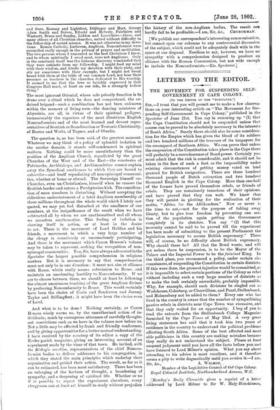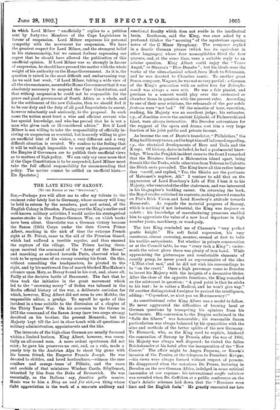LETTERS TO THE EDITOR.
THE MOVEMENT FOR SUSPENDING SELF- GOVERNMENT IN CAPE COLONY. [To THE EDITOR OP THE "SPECTATOR."] Sin,—I trust that you will permit me to make a few °Nem- tions on your interesting article on " The Movement for Sus- pending Self-Government in Cape Colony," published in the Spectator of June 21st. You say in summing up " (1) that the Cape Constitution should not be suspended unless that course can be proved to be absolutely necessary in the interests of South Africa." Surely there should also be some considera- tion for the Empire which has given the blood of its soldiers and two hundred millions of the treasure of its taxpayers for the reconquest of Southern Africa. We can prove that unless the suspension of the Constitution takes place in the Cape there will probably be a recrudescence of Bond power. Certainly you must admit that the risk is considerable, and it should not, be taken in the face of such a fact as the impossibility under existing circumstances of getting money voted on land granted for British emigration. There are three hundred thousand people of Dutch extraction and two hundred thousand English in the Cape Colony. More than one-half of the former have proved themselves rebels, or friends of rebels. They are notoriously tenacious of their opinions, and have proved that they can wait. We know that they will persist in plotting for the realisation of their motto, " Africa for the Afrikanders." Now or never is the time to act,—not for the purpose of taking away liberty, but to give true freedom by preventing one sec- tion of the population again getting the Government completely in its clutches. You say " (2) that this necessity cannot be said to be proved till the experiment has been made of submitting to the present Parliament the legislation necessary to secure British supremacy." There will, of course, be no difficulty about British supremacy. Why should there be ? All that the Bond wants, and will get unless there be suspension, is to be the Mayor of the Palace and the Imperial Power to be the faineant King. In' the third place, you recommend a policy, under certain eir. cumstances, of suspending the Constitution in certain districts. If this were done, the grossest injustice would be committed, as it is impossible to select certain portions of the Colony as rebel without including such a very large number of districts as to make the task certainly unworkable, probably impoSsible; Why, for example, should such divisions be singled out as Wodehouse, Colesberg, or Clanwilliam, and Paarl, Stellenbosch, and Malmesbury not be added to them ? Every one who has lived in the country is aware that the number of sympathising• passive rebels in districts near Cape Town was excessive, and that they only waited for an opportunity. I beg of you to read the extracts from the Stellenbosch College Magazine furnished by the Cape Times of May 23rd. A very great living statesman has said that it took him two years of residence in the country to understand the political problems affecting South Africa. Some of the best affected and most able politicians in this country are making mistakes because they really do not understand the subject. Please at least suspend judgment until you have all the facts before you and have listened to Lord Milner's opinion. What you say about attending to his advice is most excellent, and it therefore seems a pity to write dogmatically until you receive it.—I am,
Sir, &c., A. WILMOT, •
Member of the Legislative. Council of thd Cape Colony. Royal Colonial Institute, Northumberland Avenue, W.C.
[Monday's Daily Chronicle gives a reprint of a letter addressed by Lord Milner to Sir W. Hely-Hutchinson, in which Lord Milner " unofficially " replies to a petition sent by forty-two Members of the Cape Legislature in favour of suspension. Lord Milner expresses his personal sympathy with the movement for suspension. We have the greatest respect for Lord Milner, and the strongest belief in his statesmanship, but we cannot forbear expressing our regret that he should have allowed the publication of this unofficial opinion. If Lord Milner was so strongly in favour of suspension, be should have pressed the matter with the whole weight of his authority on the Home Government. As it is, the question is raised in the most difficult and embarrassing way. As we said last week, if Lord Milner, taking a wide view of all the circumstances, assuredthe Home Government that it was absolutely necessary to suspend the Cape Constitution, and that withoit suspension he could not be responsible for the peace and good government of South Africa as a whole, and for the settlement of the new Colonies, then we should feel it to be our duty and the duty of all good Imperialists to assent, however reluctantly and anxiously, to the proposal. In such cases the nation must trust a wise and efficient servant who has special knowledge, and who has proved that he is not a man who gives rash or ill-considered advice." But if Lord Milner is not willing to take the responsibility of officially in- sisting on suspension as essential, but is merely willing to give an unofficial hint of his wishes, a very different and a very difficult situation is created. We confess to the feeling that it will be well-nigh impossible to carry on the government of the Empire if Governors are to publish their unofficial views as to matters of high policy. We can only say once more that if the Cape Constitution is to be suspended, Lord Milner must take the full official responsibility for recommending that policy.' The matter cannot be settled on unofficial hints.— ED. Spectator.]



















































 Previous page
Previous page